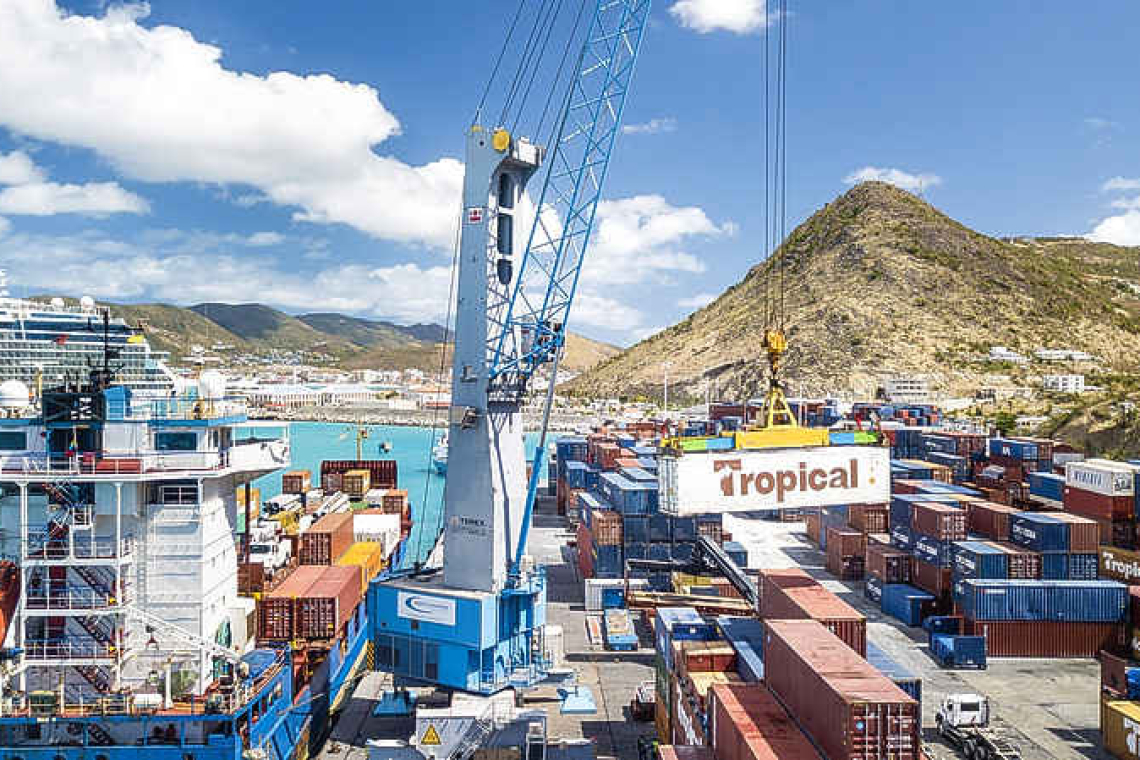Cargo handling at Port St. Maarten.
PHILIPSBURG--Port St. Maarten is closely monitoring the ongoing United States East Coast and Gulf Coast dockworkers strike, which could affect the island’s supply of goods and essential items from the United States. The strike, which began at midnight on Tuesday, October 1, is impacting 36 ports from Searsport, Maine, to Brownsville, Texas.
The affected ports handle about half of the United States ocean imports. The strike is causing concern among importers and businesses in St. Maarten that rely on US goods, particularly fresh produce, food products and medical supplies. Although contingency plans have been put in place by some shippers, a prolonged strike could lead to disruptions in the flow of goods to the island.
Port St. Maarten Group (PSG) Chief Executive Officer (CEO) Alexander Gumbs has been in contact with local shipping companies and other stakeholders to assess the potential impact. While early indications suggest a minimal immediate effect on the island’s supply chain due to non-unionised ports on the US eastern seaboard, Gumbs emphasised that the situation is being closely monitored. If the strike continues, disruptions to shipments of goods and essential items could grow.
In the automotive sector, Real Auto car dealership issued a public notice to customers on October 1, warning of delays in vehicle orders due to the strike. “We regret to inform you that due to strike actions affecting ports across the United States, there will be significant delays in our orders starting today [Tuesday – Ed.]. The duration of this strike is currently uncertain, and we will communicate further details as soon as these become available. We will provide regular updates as the situation develops. We appreciate your patience and understanding during this challenging time,” the notice read.
The strike involves about 45,000 International Longshoremen’s Association (ILA) workers who walked off the job at midnight on Tuesday. Their action is targeting the United States Maritime Alliance USMX, a coalition of ocean container carriers, port associations and terminal operators. Workers are demanding higher wages and greater protections.
This is the first strike at these ports since 1977, and it could cost the US economy up to US $5 billion a day. Experts warn that it may disrupt holiday shopping for millions of Americans and affect the profitability of many small- and medium-sized businesses, as well as farmers across the country.
Despite the large scale of the strike, it does not affect cruise lines or military operations. Ports like Port Canaveral and South Florida’s major cruise hubs, PortMiami and Port Everglades, remain unaffected. These ports continue to operate normally for cruise ships, as the ILA strike focuses solely on cargo operations.
In the cruise industry, Carnival Brand Ambassador John Heald took to Facebook to reassure passengers that their cruise plans would not be impacted. “Your question has been what is or isn’t going to affect the Cruises this coming weekend? The answer is no, it won’t,” Heald posted. “Thank you, and if anybody does not understand this, please phone a friend.”
He further emphasised that the ILA has confirmed that cruise lines will not be impacted by the strike. Heald added, “ILA Longshore workers will continue to work Passenger Cruise vessels at all ILA ports, to not inconvenience the tens of thousands of Americans who have booked trips in advance. We understand that many families plan and pay for cruise vacations on passenger ships more than a year out, and we don’t want them to be disappointed or inconvenienced in any way.”
According to port CEO Gumbs, the majority of goods imported to St. Maarten are currently unaffected, but the situation could change if the strike continues for an extended period. “We are advising shippers to maintain close contact with local cargo offices for updates on the situation,” Gumbs stated.
Analysts predict that if the strike persists, it could disrupt the shipping of goods such as food, auto parts and construction materials. This would lead to price increases and supply shortages in St. Maarten.
American President Joe Biden has so far rebuffed calls by some of country’s biggest business groups to use federal power to reopen the ports for 80 days, suspending the strike to provide a cooling-off period for further negotiation.
“It’s only fair that workers, who put themselves at risk during the pandemic to keep ports open, see a meaningful increase in their wages as well,” Biden said. “Now is not the time for ocean carriers to refuse to negotiate a fair wage for these essential workers while raking in record profits.”
Ships are starting to anchor outside of the affected ports waiting to see what is going to happen.
Port St. Maarten will continue monitoring the situation, working with shipping lines to mitigate any possible delays. Consumers and businesses alike are urged to stay informed, as the strike’s duration remains uncertain.







